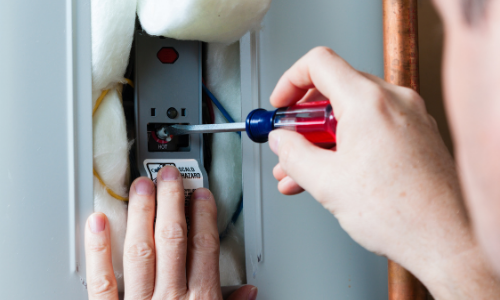Responding to the Primary Water Heater Urgencies
Responding to the Primary Water Heater Urgencies
Blog Article
What are your insights and beliefs on Is Your Water Heater Leaking??

A hot water heater is one of one of the most important basic appliances that can be located in a residence. With hot water heater, you do not require to experience the stress and anxiety of home heating water by hand whenever there is a requirement to take a bath, do the laundry, or the recipes. Nonetheless, there is constantly a possibility that your water heater would certainly act up as with the majority of mechanical devices.
It is essential to keep in mind any type of little breakdown as well as tackle it promptly prior to points leave hand. Most times, your water heater starts to malfunction when there is a build-up of debris as a result of continuous usage. As a safety measure, periodic flushing of your hot water heater is recommended to avoid sediment accumulation and stop functional failure.
Usual water heater emergency situations and exactly how to take care of them
Dripping hot water heater storage tank.
A leaking container could be a sign of deterioration. It might create damage to the floor, wall surface and also electrical tools around it. You can even go to risk of having your home flooded. In this situation, you need to turn off your water heater, enable it to cool, and carefully try to find the source of the issue. Sometimes, all you require to do is to tighten a few screws or pipeline links in cases of minor leakages. If this doesn't work as well as the leakage lingers, you could require to employ the services of a specialist for an appropriate substitute.
Changing water temperature level.
Your water heater might begin producing water of various temperatures normally ice cold or hot warm. In this situation, the first thing you do is to guarantee that the temperature level is set to the wanted level. If after doing this, the water temperature level keeps transforming during showers or various other activities, you may have a faulty thermostat. There may be a need to replace either the home heating or the thermostat device of your water heater.
Too little warm water
It might be that the water heating system can't support the warm water need for your apartment. You could upgrade your water heater to one with a larger ability.
Discolored or odiferous water
When this happens, you need to understand if the problem is from the container or the water resource. If there is no amusing odor when you run chilly water, then you are certain that it is your water heater that is faulty. The stinky water can be created by corrosion or the build-up of germs or sediments in the water heating system storage tank.
Final thought
Some property owners ignore little caution as well as minor faults in their water heater device. This only leads to more damage and also a feasible complete failure of your home appliance. You need to take care of your water heater mistakes as quickly as they come up to stay clear of more costs and unnecessary emergency problems.
With water heaters, you do not need to go through the stress and anxiety of heating water by hand every time there is a demand to take a bath, do the washing, or the recipes. Your water heating unit can begin creating water of different temperature levels usually ice chilly or scalding warm. It may be that the water heating system can not sustain the warm water need for your house. If there is no funny odor when you run chilly water, then you are specific that it is your water heating unit that is malfunctioning. The smelly water can be triggered by rust or the build-up of germs or sediments in the water heater container.
Common Water Heater Issues and What You Should Do
What Type of Water Heater Do You Have?
Before we begin it’s first important that you identify the type of water heater you have on your property. There are two main types of water heaters out there: conventional and high efficiency.
Both of these types of products typically use either gas or electricity to heat power. There are also solar water heaters that use a thermal collector on the roof or yard to heat the water.
While these models are not as common, they can cut heating costs in half. In this article, we will focus on conventional and high efficiency.
How Do My Electric and Gas Water Heater Work?
Though they look similar, electric and gas water heaters work very differently. It’s important to know their basic function because often problems can be specific to the heating source.
In the electric model, a thermostat on the side of the machine detects the temperature of the water in the tank. When the temperature needs to rise electricity flows to a heating element suspended in the water.
Gas models also use a thermostat device — typically with a mercury sensor at the tip and an additional sensor called a thermocouple. The thermocouple detects whether the pilot light is on and controls the flow of gas.
When the thermostat drops below the appropriate level gas is released which becomes ignited by the pilot light. The flame heats the bottom of the water tank which causes hot water to rise and cold water to drop.
This natural circulation continues until the water reaches the desired temperature. Then, the thermostat triggers the gas control valve to shut off the flow of gas.
What Are the Most Common Issues and How Do You Fix Them?
https://happyhiller.com/blog/common-water-heater-issues-and-what-you-should-do/

We were made aware of that editorial on Warning Signs You Need Water Heater Repairs through an acquaintance on a different site. Sharing is nice. Helping others is fun. I am grateful for your time. Visit us again soon.
More Details Report this page